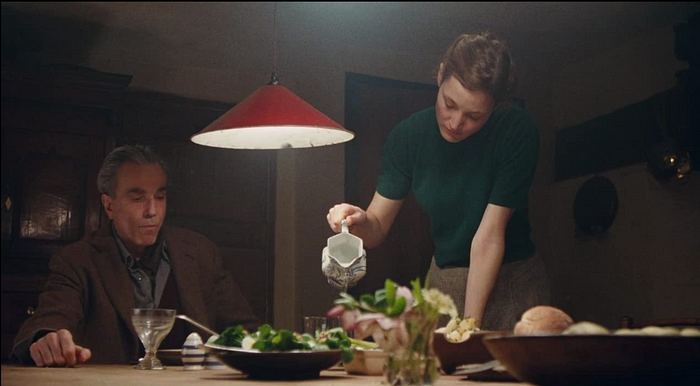Review: Phantom Thread
A sophisticated and elegant film that features a toxic relationship, toxic masculinity and anti-feministic heroine.

Anderson’s Phantom Thread which won an Oscar and a Bafta for Best Costume Design, is a riveting, multi-faceted film worth re-watching over and over again to uncover and digest its many layers. Right from when the simplistic, sophisticated black and white title card (reminiscent of classic films) rolls on to the screen, the film immediately boasts of phenomenal cinematography and an alluring, yet slightly twisted score composed by Jonny Greenwood complements the storytelling of the gothic romance in such a way that it is an integral part of the film.

What happens?
Set sometime during the postwar period, we are introduced to the House of Woodcock, the home and atelier of the celebrated fashion designer Reynolds Woodcock, played by the charming Daniel Day Lewis in what he claims to be his last performance, and his efficient sister Cyril who runs his business and affairs. The House of Woodcock has a formidable reputation of not only making astoundingly elegant dresses for women in high society but also for making these women feel beautiful within. Reynolds heavily relies on his strict routines in order for him to operate creatively and efficiently on his designs. Any changes or confrontations over a quiet breakfast can ruin his day completely.
Like in many gothic romances, where the skies are often grey and the scenes are mostly shot in dimly lit rooms, lit only by flame of candlelight or a fireplace, the love story features an unconventional relationship where at least one of the couples is not quite as they seem. This
one begins during a trip Reynolds took to the countryside, where he meets Alma, a reserved waitress working in diner. They fall in love and he takes her to his home, and she becomes the centre of his attention. She becomes his lover, muse and model for his dresses.

In his eyes and his dresses, Alma feels beautiful. Thus, begins a blissful relationship that gradually changes the longer she lives with Reynolds. Alma begins to notice the controlling and strict side to Reynolds whenever he is working. She begins to feel pushed aside and second to Cyril when it comes Reynolds’ daily affairs. Things begin to shift in their relationship as Alma defies and challenges Reynolds, particularly his superfluous demands and routines at the breakfast table. Alma becomes a nuisance and distraction to Reynolds’ work. Nevertheless, there are highs in their relationship. Alma, born out of her affections for Reynolds’, has become a defender of his work. When Barbara Rose, an important customer yet has a wayward personality (as she appears intoxicated), comes to Reynolds for a dress with an invitation to her wedding, Reynolds was reluctant to dress her. Nevertheless, he did and attended the wedding. Seeing Barbara drunk in his dress, Alma finds her disrespectful and undeserving of his dress and helps Reynolds take the dress back, fortifying their relationship.
Alma relishes being in the centre of Reynolds’ attention and affections. She is needed and essential in his life. So, when the beautiful Princess Mona enters the atelier, she becomes jealous as she watches Reynolds’ attention shift from her to Mona. Feeling distant and set aside once again. She plans a surprise date so that they could have some time together. She sends everyone home and makes a home-cooked dinner for him, only for the date to end in a disastrous confrontation. It’s evident in the childish bickering between the two that they are locked in a toxic relationship.

A Toxic Romance
In most romances, we expect some sort of resolution, or a character arc with distinct changes in the behavior or attitude of the two protagonists. Yet, this isn’t the case for Alma and Reynolds. Neither are reluctant to yield or change for their partner. Their differences in their way of life continues to clash. Reynolds refuses to consider Alma’s wishes and complaints and stands by his routines. A wise decision for Alma is to leave this relationship. Instead, her resolution to their issue is quite peculiar: poisonous wild mushrooms.
She slips crushed poisonous mushrooms into Reynolds’s drink, rendering him sick to the point where he feels like he’s dying and has hallucinations of his dead mother. What does Alma gain from this? She gets to feel needed again as she takes care of poor sick Reynolds. Hurting one’s partner to get them to love and need you is an anomalous solution, but it works for Alma. Soon after Reynolds recovers, he apologises to her, tells her how much he needs her in his life and marries her with promises that he will change his routine to accommodate her.
The honeymoon phase did not last very long. Their differences continue to remain apparent. Alma dislikes playing board games that she does not understand, and Reynolds refuses to go dancing with her at a New Year’s Eve party. Perhaps it’s the age gap or they simply have differing preferences. Regardless, having to change his routine to be more acceptable of Alma’s behaviours, she becomes even more of a nuisance and distraction to Reynolds. In an emotional conversation with Cyril, he admits what a mistake bringing Alma into their lives is, unbeknownst to him that Alma overheard his complaints. As a final retaliation, she poisons him once again. This time, she confesses to making him sick for the reason that she likes him tender, and soft when he is sick so she can take care of him. Strangely, with this knowledge he realises Alma’s devotion to him and gives her a passionate kiss before he gets sick. Their version of happily ever after is one where he is unwell but in Alma’s loving care.

Toxic masculinity
Reynolds displays traits of toxic masculinity particularly in his relationship with Alma. Surrounded by female workers and seamstresses in his atelier, as well as sister, he is used to being in charge and having things go his way and by his will. When Alma challenges his routines or voices out her opinions, not only does he disregard her inputs but pushes her aside and treats her as nuisance, instead of a partner, which only worsens their relationship. Additionally, he can be a controlling figure. Besides demanding to have things go his way, for instance a quiet breakfast with no confrontations or loud buttering of the bread. He also controls the way a woman looks. On their first date, He removes the lipstick of Alma’s face because he didn’t like it. He also demonstrates his control over a woman’s body by changing its shape and features. While taking Alma’s measurements, she apologises for lacking in the breast area. He reassures her “My job is to give you some if I choose to”.

Flawed portrayal of Women
A flaw in this film is in how majority of the women, especially those around Reynolds, are portrayed. A common flaw in amongst the women who come to the House of the Woodcock, is their lack of self-confidence. Henrietta, one of Reynold’s clients, claims “I feel like it will give me courage.” This is more apparent in Alma’s character. Before Reynolds, she lacks self-esteem. Only finding flaws in her body; her shoulders too wide, her neck skinny like a bird, hips larger than needed and her arms strong. But when Reynold’s dresses her, she asserts “in his work I become perfect.” The reliance of these women on Reynold to make them feel beautiful about themselves sends a message counter to feminist ideals.
Looking further into Alma’s character, it’s disappointing that little attention is given to her character’s development. Besides the fact that she waitress we don’t know much about her life before meeting Reynolds, her history or origins. We can only guess that she might be from a developing European country based on her accent as well as the remark made by Lady Baltimore “There some custom in this time of the night in her country, where. If she’s up to stealing things or attacking people.” Without knowing much about her, she gives the impression that her life story begins and ends with a man (Reynolds).

Moreover, the stereotypical ideas of being a woman is reflected in Alma. The idea that a woman should serve her male partner. She devotes her entire self and her life to Reynolds. Her sole aim is to be needed and indispensable to him. When she feels like that is threatened, she poisons him so he would need her to take care of him like a baby, “tender and soft”. In this manner, Alma is portrayed like an antagonistic witch, cooking a poisoned meal to keep the man she loves.
Yet, we can read Alma’s “poisoned mushroom omelette” as way of repressed women taking back their power. Using the kitchen and food, the area where women are stereotyped to belong to, as a weapon to get what they want. In Alma’s case, it’s a way for her to get dominance, power and what she wants from their relationship. When she weakens Reynolds, their positions switch, and she becomes dominant.
Visit our website www.tfphk.com for more articles like this!
Photo Source: Phantom Thread. Paul Thomas Anderson. Universal Pictures, 2017. Film.
Disclaimer: Any views and opinions expressed are personal and solely belong to the authors. They are not intended to malign any religion, ethnic group, club organisation, company, individual or anyone or anything.










